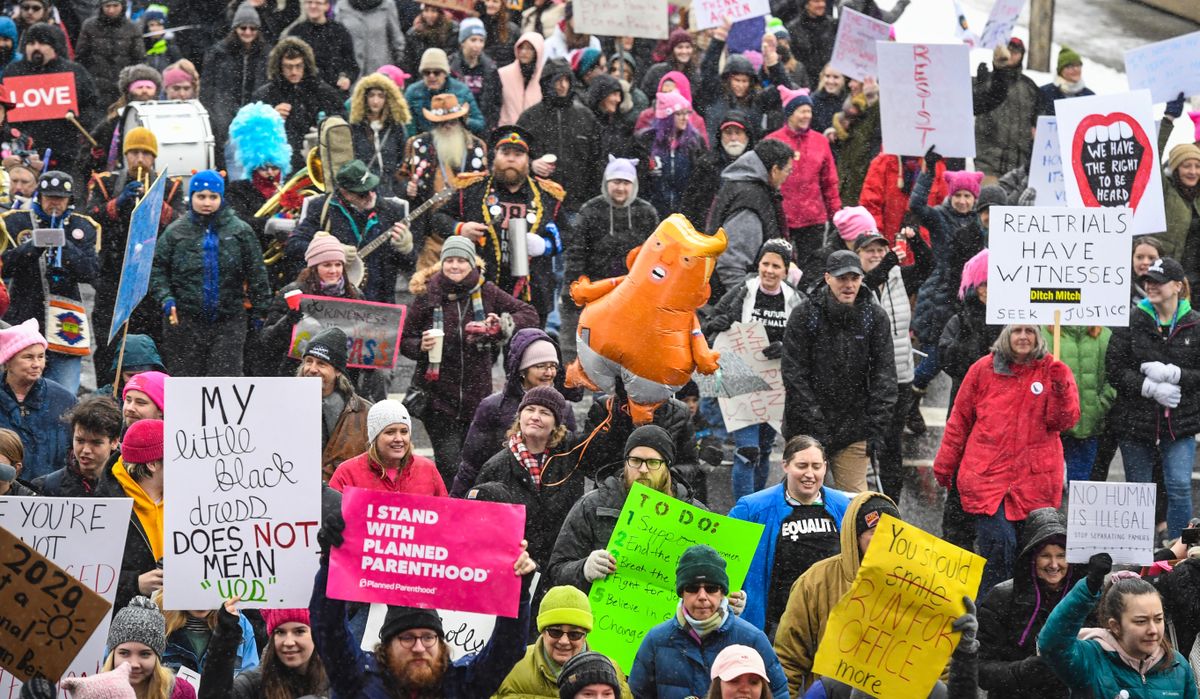‘I have a voice’: Women’s March demonstrators unite different causes under banner of resilience

Each of the past three years, thousands of people have marched through downtown Spokane in Women’s Marches with themes of ‘resist,’ ‘persist’ and ‘insist.’ On Saturday, a smaller group of around 1,000 demonstrators championing various causes marched through cold and snow under a banner of resilience.
“This year was intended to be about progress,” said Maria Garcia-Bachman, Women’s March organizer for the past four years. “The things that we are each doing in our individual communities to make a difference, to bring positivity, to encourage change.”
Before the march, Washington State University medical student Marleny Carmona spoke about gender bias in relation to her experience of people assuming she is a nursing student.
“In this country, even in 2020, we are more inclined to envision professionals as men,” Carmona. “We have to be aware of our gender biases and hold ourselves to higher standards.”
She also talked about meeting a Latina physician for the first time in her first year of medical school.
“She is the person I envision becoming,” Carmona said. “If she can do it, I can do it, too. And if I can do it, little brown girls from Mattawa who want to be doctors can do it. … And maybe one day people will stop asking Latinas and other brown girls what kind of nurse or assistant they want to be when they say they want to be doctors or professors or lawyers.”

Spokane Falls Community College sociology professor Ping Ping, a Chinese immigrant, spoke to the crowd about the moment she realized she was American and learned about the stereotype of Asian Americans “not stirring the pot.”
She said she first learned she had to speak up when hearing about Vincent Chin, a Chinese American who was murdered in 1982 by two white auto workers who were angry about the success of the Japanese car industry. The men faced lenient sentences and federal hate crime legislation wasn’t a reality until more than a decade later.
“It was at that moment I realized I am an Asian American, and I am American. I have a voice,” Ping said “I want to stand up for people who couldn’t speak up for themselves.”
She also told the story of feeling marginalized by a student who wouldn’t respect class rules, telling her he had First Amendment rights. He later emailed her saying people who don’t believe in free speech should move to communist Russia or North Korea.
“The tone in his voice had been threatening. The tone in his email was threatening. He marginalized me, made me feel I, as a woman, a foreigner, I do not have the power to make rules for the class,” said Ping, who did not report him hoping her sociology class would open his mind. “But at the end of the quarter I saw a change. The student’s attitude was different.”
She said he wrote in an essay that the class helped him see new perspectives and that she “found a pure sense of happiness” in his realization.
Public school librarian Amanda Mead, who hosts the women’s history podcast “I Don’t Know Her,” told stories about trailblazing women, as well as her own story of childhood sexual abuse.
When she told her mother how her stepfather sexually abused her, she was whisked away to stay with other family, she said. But months later her mother stopped believing her, and her home was more dangerous than before when she returned.
Mead said she found support from a few people and the strength to persevere after previously coping in unhealthy ways.
“I’m here today somehow alive and fighting,” Mead said. “But my story isn’t unique.”
Noting the strength of survivors of abuse, as well as powerful women throughout history, she said to the crowd, “It’s time for you to find your strength and move forward.”
Gonzaga University freshman Teagan Kramer said she attended the march on her first weekend back from holiday break with the Equal Rights Amendment and wage equality in mind.
Fellow GU freshman Delaney Yehle, a nursing student, added, “We were reading in our textbook that women nurses don’t get paid the same as males, so we came out here for that.”
“Also for abortion rights, because I think women have the right to choose what to do with their bodies and I don’t think the government should interfere with that,” said Ciara O’Dea, another Gonzaga freshman.
Anna Trusty, of Mujeres in Action, marched alongside her daughter with domestic violence and sexual assault survivors in mind. She mentioned one case of lenient punishment for a man convicted of child rape in Idaho recently.
“I think these laws need to change,” Trusty said. “It’s not OK for men not to pay for hurting women.”
Raging Grannies member Janet Farness said she hopes to see environmental policy enacted and more female representation in government in 2020.
We’d like “to get our voting rights energized and everybody realize they can make a difference in the election,” Farness said. “We want people’s voices to be heard, and we want every voice to be heard.”
A number of Planned Parenthood supporters also marched together at the event.
“I think our fundamental right to choice is seriously under attack,” Karn Nielsen said.
Garcia-Bachman, the rally organizer, referenced declining attendance at the march – down from 8,000 in 2017 and 3,000 last year – which she said is to be expected.
“Because maybe at times you kind of wonder, ‘What are we marching for?’ ” she said, while also noting the poor weather. “That’s OK, because I think there are people out who want to be out here, need to be out here.
“For me this is about keeping my kids engaged, teaching them the difference between right and wrong, teaching them how to respect people of all colors and races and genders.”